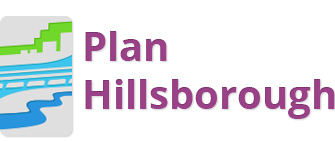2021
2021 has been a year of tremendous innovation and
adaptation for Plan Hillsborough. Our team has tackled
emerging issues in our community and developed new
solutions and approaches. In partnership with our local
government partners and agencies, many initiatives
have moved forward over the last year – all with the
goal of improving quality of life with input from
community stakeholders. Plan Hillsborough expanded the Transportation Planning Organization’s regular update of their Nondiscrimination Plan to cover all aspects of our
organization, grew the Future Leaders in Planning (FLiP) program to include FLIP Jr (geared towards elementary and middle school children), and engaged the community to help shape several updates to the Comprehensive Plans for the four local governments.
View the 2021 Annual Report for more information on what Plan Hillsborough accomplished in 2021.
2020
As planners, we like to anticipate what is coming ahead, but none of us could have imagined how COVID-19 would change our plans this year. From how we achieve our work tasks to our work environment, a lot has changed in the last year. When the health pandemic became prevalent in our community and County Center closed to the public, our staff was able to quickly adapt to working remotely. Projects that needed community outreach were quickly transformed to include online surveys and virtual meetings. We have learned how to use various types of virtual meeting software to ensure we could continue conducting Planning Commission, Metropolitan Planning Organization (MPO), and River Board meetings and keep action items moving forward. Our work products have adapted as well. Project timelines were shifted as the focus in our community turned to addressing the pandemic and its impacts on our community members. Our Annual Planning & Design Awards was converted to a video production so we could virtually celebrate great planning in our community. In many cases, holding meetings and events virtually allowed even greater public participation.
View the 2020 Annual Report for more information on what Plan Hillsborough was up to in 2020.
2019
This year we celebrated the 60th anniversary of the Planning Commission. Since October 1959, the Hillsborough County City-County Planning Commission has been guiding the growth and development of our community. The role of the Planning Commission has evolved into a partnership with each jurisdiction and the community stakeholders we serve, as illustrated by many of the projects highlighted in this year’s Annual Report. As we look back, we find many successes that moved our community toward its long-range vision.
Localized roadway corridor studies such as Bullard Parkway’s Complete Street, the East Fowler Avenue Land Use study, and the North Alexander Street Extension study have focused on the need for context-sensitive roadway design that supports the land use vision along the roadway while fostering safety and walkability. Planning for the preservation of our assets and neighborhoods is a focus for the organization. Our work supported the creation and planning of the update of the Ybor City Vision. In Unincorporated Hillsborough County, the Planning Commission supported 22 community plans that were developed and adopted in the Comprehensive Plan. Support of Plant City and Temple Terrace’s downtown redevelopment plans have been a major focus of our work as well. The Imagine 2040 Comprehensive Plans for the Cities of Tampa, Temple Terrace, and Plant City were recognized nationally by the American Planning Association in their Comprehensive Plans for Sustaining Places program.
View the 2019 Annual Report for more information on what Plan Hillsborough was up to in 2019.
View the 2019 Strategic Plan and Measures of Effectiveness Report for a more in-depth look at how Plan Hillsborough achieved its goals in 2019.
2018
At Plan Hillsborough, our goal with everything we do is to make our community a better place to live, work, and play. Whether it is reviewing a site plan zoning for a specific piece of property or a large scale regional project, all have the same goal of trying to advance the community’s vision as outlined in the Comprehensive Plans and the Long Range Transportation Plan. These guide how we will grow, what transportation choices we will have and how we will protect our community assets.
There are big projects like our record-breaking outreach on It’s TIME Tampa Bay. Coordinating with Pinellas and Pasco MPOs, we worked together to develop three very different transportation investment scenarios to see how they would influence our community’s growth. We received unprecedented input from the community with nearly 10,000 people across the three counties weighing in. It was exciting to tackle this project in a new way with this regional approach and to get such valuable feedback from the community. This shapes not only the Long Range Transportation Plan, which will be updated in 2019, but also the policy initiatives studied for the Comprehensive Plans.
Smaller projects also have a big impact on the evolution of our community. Studies of specific roadway corridors like North Alexander Street in Plant City and proactive plan amendments in the City of Tampa have been opportunities to look at trends and make sure our land use plans are reflective of changes in our community. Examples, such as the Fowler Avenue Study, are important to make sure the vision for how roadways will transform and redevelop guides the type of transportation and infrastructure improvements that will be made. And projects like Garden Steps look at how, even at the more micro neighborhood level, we can influence the land use and transportation system to support people having access to healthy food.
View the 2018 Annual Report for more information on what Plan Hillsborough was up to in 2018.
View the 2018 Measures of Effectiveness Report for a more in-depth look at how Plan Hillsborough achieved its goals in 2018.
2017
The accomplishments of the Plan Hillsborough staff in 2017 are many! Vision Zero required numerous partnerships to create and begin to implement an action plan. Redistricting for the City of Tampa likewise necessitated building trust as we identified important needs within our community. We thought out of the box and have used technology to our advantage by creating an eCeptionist to replace our retiring receptionist and a Community Health Atlas to provide planners and citizens with a baseline profile of community health. We provided a transparent process and open communication in projects like the Brandon East-West Corridor Study and the Plant City Road Extension Studies. We also undertook an outside review by students at the University of South Florida to look for opportunities to do things more efficiently and to make better use of our resources. We added on-site office hours at each of the three cities to better meet the needs of the jurisdiction and clients who seek our services. In additon, we led by example in creating a Commuter Challenge and by giving back to the community through participating in Habitat for Humanity’s Women Build and a community clean-up at Harvest Hope Park.
2016
Over the last year, we collaborated with the School District and many other partners to host our first Future Leaders in Planning program to educate high school students on the planning profession. We collaborated with Tampa, Temple Terrace and Plant City on completing the updates to the Comprehensive Plans. The City of Tampa’s Plan was recognized by the American Planning Association with their Silver Level Sustaining Places Award for Comprehensive Plans. We have collaborated with the Department of Health on furthering a health in all policies strategy and have been awarded two grants to further those efforts. We collaborated with Hillsborough County, HART and FDOT on a pilot project to study the transportation and land use issues along major east-west corridors in the Brandon area. And these are just a few highlights of the projects and accomplishments this year.


